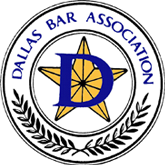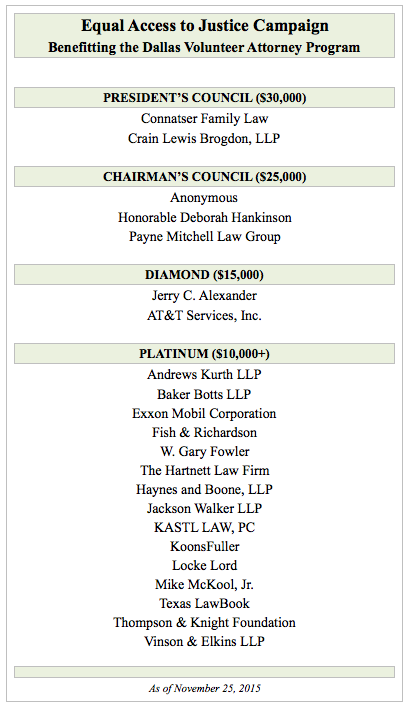© 2015 The Texas Lawbook.
By Mark Curriden
(Dec. 3) – Despite the fact that about one in every 300 or so people living in the DFW area are lawyers, tens of thousands of people in need of legal assistance in North Texas don’t get it because they cannot afford it.
From war veterans needing legal advice on benefits and low-income homeowners involved in property line disputes to disabled workers denied benefits, many citizens in Dallas simply cannot afford to hire a lawyer today.
 “A legal system that does not work for everyone will eventually breakdown completely and fail,” says Dallas trial lawyer Andy Payne.
“A legal system that does not work for everyone will eventually breakdown completely and fail,” says Dallas trial lawyer Andy Payne.
Payne is one of several hundred lawyers who pledge money to the Dallas Bar Association’s annual Equal Access to Justice Campaign, which funds the Dallas Volunteer Attorney Program.
The goal is to raise $700,000 by the end of December. The campaign chairs this year – Barnes & Thornburg partner Victor Vital and Fish & Richardson partner Bill Mateja – have been hugely successful, raising $666,019.32 so far.
Payne, a partner at the PayneMitchell Law Group, donated $25,000 to this campaign this year and more than $200,000 during the past decade.
“It’s the right thing to do,” Payne says. “When you are blessed by the system that allows you to make a good living, it is the right thing to do to give back.”
Two law firms – Crain Lewis Brogdon and Connatser Family Law – each contributed $30,000. Former Texas Supreme Court Justice Deborah Hankinson joined Payne in giving $25,000. Jerry Alexander, a partner at Passman & Jones, and Dallas-based AT&T each donated $15,000.
AT&T General Counsel David McAtee is the honorary co-chair of the campaign.
Last year, DVAP helped 4,309 individuals thanks to the contributions of lawyers such as you.
But $700,000 is the minimum amount needed. Campaign leaders believe that they can raise $1 million. To help make that happen, please visit www.dvapcampaign.org.

© 2015 The Texas Lawbook. Content of The Texas Lawbook is controlled and protected by specific licensing agreements with our subscribers and under federal copyright laws. Any distribution of this content without the consent of The Texas Lawbook is prohibited.
If you see any inaccuracy in any article in The Texas Lawbook, please contact us. Our goal is content that is 100% true and accurate. Thank you.
